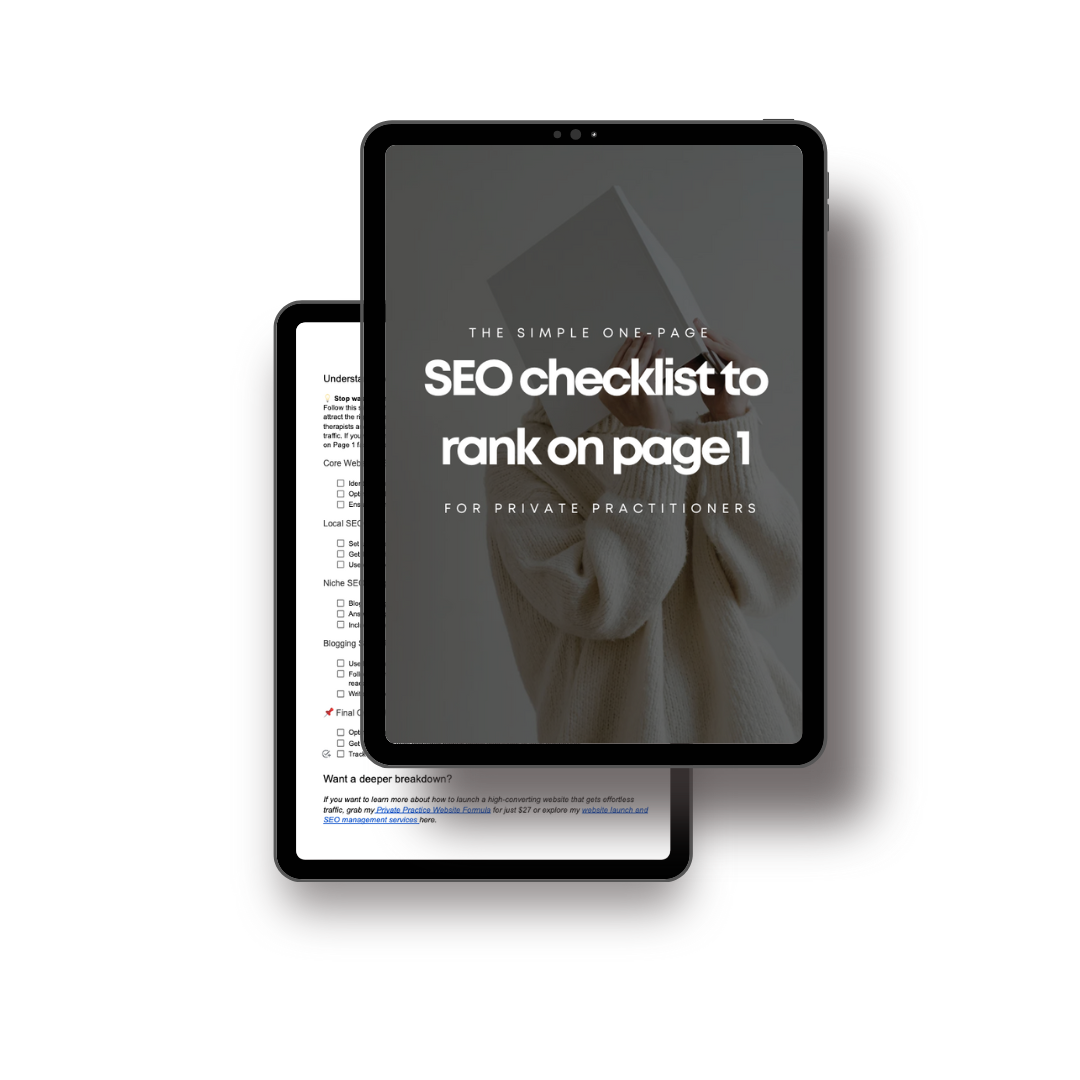Is therapy business coaching worth it and when is it right for you?
You’ve heard the success stories: therapists who’ve grown thriving practices with the help of a business coach, filling their calendars with dream clients and scaling their income. But you might be wondering, Is business coaching worth it for me? And if it is, what’s the best way to make it work without adding even more to your already packed plate?
Here’s the truth: Working with a business coach is an incredible investment, but you don’t have to do it all yourself. Your website, SEO, and marketing don’t need to become your second (or third) job. Let’s explore when business coaching makes sense, how to use it effectively, and what tasks you can—and should—outsource to create a balanced, sustainable practice.
Hi there! I’m Natalia Maganda, awebsite designer for therapists. I help private practice professionals amplify their expertise and attract their ideal clients through strategic web design and clear messaging. If you’re tired of juggling client care, marketing, and running your practice all on your own, this post is for you. Let’s talk about how therapy business coaching and a website that works for you can make all the difference.
What is therapy business coaching and who is it for?
You’ve heard the success stories: therapists who’ve grown thriving practices with the help of a business coach, filling their calendars with dream clients and scaling their income.
Therapy business coaching is like having a strategic partner who helps you navigate the business side of your private practice with clarity and confidence. It’s for private practice owners who are ready to grow but need help creating a sustainable plan.
*This post contains sponsored links
Key benefits of working with a business coach
- Clarity on your goals: Coaching helps you cut through the noise and focus on what matters most.
- Accountability and support: You’ll have someone keeping you on track and cheering you on.
- Tailored strategies: Whether you’re building your brand, attracting more clients, or scaling your services, a coach creates a plan that fits your practice.
When is therapy business coaching worth the investment?
If you’re debating whether coaching is worth it, ask yourself: Are you stuck in the day-to-day grind of running your practice? Do you feel like you’re spinning your wheels with marketing or growth strategies? If so, coaching might be exactly what you need.
Signs you’re ready for business coaching
- You’re struggling to attract your ideal clients consistently.
- You feel overwhelmed managing all aspects of your business.
- You’re unsure how to take your practice to the next level without burning out.
Common goals coaching can help you achieve
- Clarifying your niche and offerings.
- Streamlining your client acquisition process.
- Setting financial goals and creating a plan to meet them.
What challenges does therapy business coaching solve?
Business coaching helps you shift from “I’m just trying to keep up” to “I’ve got this.” Here’s how:
Overcoming marketing overwhelm and finding clarity
Coaches help you focus on what works—like narrowing your marketing efforts to attract your dream clients instead of trying to be everywhere at once.
Attracting consistent, ideal clients
Your coach will help refine your messaging and client journey to bring in the people you want to work with, not just anyone who finds your website.
Managing growth without sacrificing your wellbeing
Growth doesn’t mean working more hours. Coaching helps you create systems that let you scale sustainably.
How therapy business coaching works with your website strategy
Here’s the thing: Your website and marketing strategy are critical parts of your growth, but they don’t need to take over your life. While your coach helps you refine your business goals and strategies, your website should do the heavy lifting of attracting clients and building trust—all without you constantly managing it.
Why outsourcing website design and SEO makes sense
- Save time: Letting a professional handle your website and monthly SEO frees up your energy for tasks only you can do.
- Better results: A strategically designed website with optimized SEO attracts ideal clients without requiring you to become a tech expert.
- Focus on what matters: With your website working 24/7 for you, you can focus on growing your practice and supporting your clients.
Topics to discuss with a business coach for therapists
Your business coach is your partner in creating a thriving practice, and the range of topics you can cover is extensive. Here are some key areas to focus on:
Strategic growth
- Clarifying your niche and offerings.
- Developing new services or income streams (e.g., workshops, courses).
- Scaling your practice without adding more work hours.
Marketing and client acquisition
- Refining your brand messaging to attract ideal clients.
- Mapping out a marketing strategy that aligns with your goals and values.
- Optimizing your client journey from first contact to booking.
Work-life balance and boundaries
- Setting boundaries around your availability.
- Delegating tasks and building a team, if needed.
- Creating systems to avoid burnout.
Tasks to outsource (so you can focus on coaching topics)
Not every task needs to stay on your plate. Here are areas you can confidently outsource:
Website design and management
A professionally designed website ensures your online presence reflects your expertise and works as a marketing tool that attracts clients—even while you sleep.
Monthly SEO management
SEO can be time-consuming, but outsourcing it means your site stays optimized and visible to potential clients without constant attention from you.
Administrative tasks
Scheduling, billing, and paperwork can often be automated or delegated to a virtual assistant, giving you more time to focus on your growth strategy.
How to decide if business coaching is right for you
If you’re still on the fence about coaching, here’s how to decide:
Questions to ask yourself before investing in coaching
- Do I feel stuck or unsure about how to grow my practice?
- Am I spending too much time on tasks that don’t directly support my clients?
- Would having expert guidance help me reach my goals faster?
Tips for finding the right coach for your practice
- Look for someone who understands the unique challenges of private practice.
- Ask for testimonials or success stories from other therapists.
- Make sure their coaching style aligns with your values and goals.
Therapy business coaching and outsourcing go hand in hand
Therapy business coaching is an incredible investment for growing your private practice, but you don’t have to do it all yourself. Outsourcing your website design and SEO ensures these critical tools work for you, not against you, while you focus on high-level strategies with your coach.
If you’re ready to grow your practice sustainably while protecting your time and energy, let’s make it happen.Launch your private practice website and start building a business that supports your goals without consuming your life.
Related reads therapist marketing:
- 10 essential therapist intake questions to connect and build trust
- How to choose a profitable therapy niche to attract higher-paying clients
- How to make $100K as a therapist without seeing 20+ clients a week
- Private practice therapist salary and tips for increasing your income
- How much is Psychology today? Pros and cons

* AI Disclosure: This content may contain sections generated with AI with the purpose of providing you with condensed helpful and relevant content, however all personal opinions are 100% human made as well as the blog post structure, outline and key takeaways.
* Affiliate Disclosure: Some of the links on www.nataliamaganda.com may contain affiliate links meaning that I will get a commission for recommending products at no extra cost to you.

hello! i'm natalia
Latina, web design expert for mental health professionals.
I help ambitious life coaches, therapists and holistic leaders amplify their magic, gain visibility, and simplify their marketing efforts through strategic web design and content.










